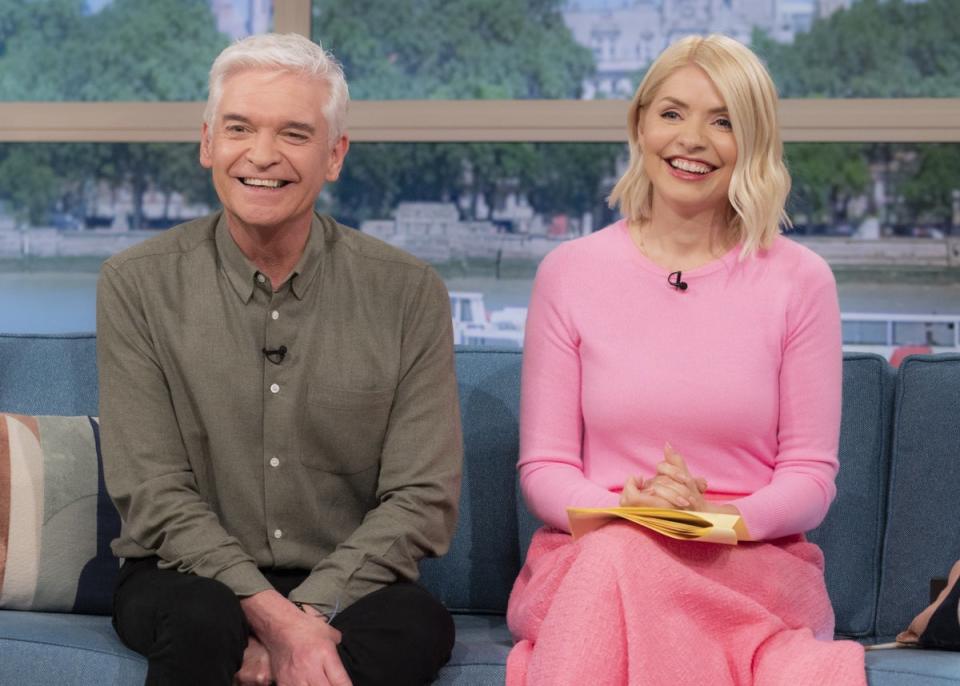OPINION - Holly Willoughby’s statement showed how degraded our public life has become

She didn’t just throw him under the bus, did she? On This Morning yesterday, Holly Willoughby stepped into the driver’s compartment, powered over the twitching remains of Phillip Schofield, put the bus into reverse — and then drove over him one last time, just to be sure.
Clad in a simple white dress (Reiss, £188) the presenter maintained the countenance of a devastated friend, the wide-eyed victim of the story. In truth, however, her 90-second statement owed more to the severe puritanism of Lady Whiteadder. She was a terrifying force of indomitable blandness.
Her former co-host, her partner on the sofa for 14 years, was mentioned by name in her statement only once. Thereafter, he merited only singular non-binary pronouns: Schofield had “acted in a way that they themselves felt that they had to resign from ITV and step down from a career that they loved. That is a lot to process.”
Is it, though? Having wrecked his career by lying about an affair with a younger man who worked as a runner on the show, Schofield faces a bleak, perhaps non-existent professional future. Willoughby is trying to ensure the show’s survival, and her own. But the rest of us? I reckon we’ll cope.
Which is why her opening question — “Firstly, are you OK?” — was so striking. Its presumptuous gravity reminded me of senior ministers’ statements to camera during lockdown or at moments of economic emergency, or in times of war; as though the internal dynamics of a single daytime television show were a matter of truly national consequence. And this preposterous echo was, I think, no accident.
In the modern cultural landscape of weaponised emotion and instant polarisation, the border between politics and showbusiness has become increasingly blurred.
For almost a month, the crisis at This Morning has dominated the headlines, as if ITV were a great department of state facing ruin. Last week, Schofield subjected himself to interviews with the BBC and The Sun precisely in the manner of a disgraced Cabinet minister clarifying the circumstances of his resignation.
Meanwhile, Baroness Hallett’s Covid inquiry must compete for public attention with the external investigation into the Schofield scandal at ITV by Jane Mulcahy KC. On June 14, the channel’s chief executive Dame Carolyn McCall will appear before the Commons Culture, Media and Sport Committee to explain why the workplace culture at This Morning seems to have made the Roy family in Succession resemble the Getalong Gang. What’s next? A Royal Commission?
On the political side of the border, we have grown used to those running for high office deploying the playbook of the entertainment industry; treating the public as an audience rather than as citizens in an engaged and informed democracy.
Boris Johnson’s big political break was Have I Got News for You? Donald Trump’s role as presenter of The Apprentice was the basis of his pitch for the US presidency. His fellow autocrat, former Brazilian president Jair Bolsonaro, ran for the top job by appearing on trashy daytime shows that none of his rivals would go near.
Indeed, it is now routine for politicians to feature on reality television: Nadine Dorries, Edwina Currie and (of course) Matt Hancock on I’m a Celebrity…Ed Balls and Vince Cable on Strictly; and Penny Mordaunt on the diving show Splash!.
All this was foretold in 1985 by the late US cultural critic, Neil Postman, in his classic book, Amusing Ourselves to Death. Television, Postman wrote, “has made entertainment itself the natural format for the representation of all experience” and transformed culture into a “burlesque”.
Emotion would trump fact; charisma would be rewarded before credentials and competence; politics and showbusiness would become increasingly indistinguishable. Four years after his book was published, Sir Tim Berners-Lee invented the World Wide Web – which, as it turned out, considerably accelerated the process.
Where has this left us? With a generation of populist politicians who devote more time to performative slogans and Twitter hashtags than to the hard yards of policy. Who dedicate at least as much time to winding up the voters as they do to sorting out their problems.
Politics is entertainment; entertainment is politics. The role reversal, the fatal confusion, is near-complete. The country, of course, is on its knees: battered by Brexit, inflation, the highest taxes for 70 years and the implosion of public services. No wonder we look for distraction. No wonder we listen when someone asks: are you OK?

 Yahoo Sport
Yahoo Sport 





































